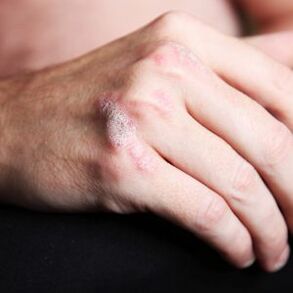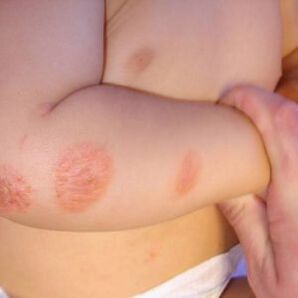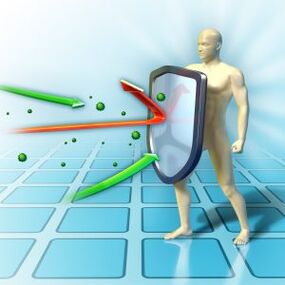
Finding an effective cure for psoriasis would be much easier for scientists if they could fully understand the reasons for its occurrence. The question “why? ” Appears not only in the luminaries of science, but also in every patient who is forced to fight this disease. Theories about incentives emerged hundreds of years ago. Today we have dozens of guessworks available, but all of them are still awaiting scientific evidence. Studying by yourself the possible causes of psoriasis will help many patients avoid relapse of the disease, and healthy people may not face it at all.
Hereditary theory
In world dermatology it has certainly been possible to determine one of the reasons for the occurrence of psoriasis - it is a genetic predisposition. Today, 60% of all psoriasis patients have a relative with the same problem. Such conclusions prompted scientists to study the theory of the hereditary origin of scaly lichen in more detail.
On April 5, 2013, the WHO Secretariat prepared a research report in this area. I installed the following:
- If one of the parents in the family is sick, the child's risk of illness is 14%.
- If both parents in the family are affected, this risk increases to 41%.
- if a sister or brother is sick - 6%.
In this case, psoriasis can appear even after several generations and "bypass" the previous ones.
An important task for biochemists was to find out which gene is responsible for such inheritance. Examination of the patient's genome identified nine loci that may be associated with psoriasis. However, the exact single gene responsible for inheriting the disease has not been established.
It is only known that scaly lichen itself is not inherited, but only a predisposition to it. This means that a person whose relatives have encountered a similar problem may not necessarily have psoriasis. Therefore, it cannot be considered an exclusively hereditary disease. In order for psoriasis to manifest itself, additional pathogens are required, which can also be viewed as causes.
Furthermore, the question about the remaining 40% of patients remains open - why did they get sick if no one in their family had a similar problem? This task forces scientists to look further into the causes of scaly lichen.
Infections and viruses as pathogens

The infectious theory of disease appeared to be one of the first and was studied about two centuries ago. Nineteenth-century scientists were certain of the fault of pathological microorganisms and diligently tried to determine which of them were responsible for this disease. This explanation seemed the most obvious since psoriasis can appear suddenly in patients and also go into sudden remission. And today there are supporters of this idea among scientists.
Supporters of the infectious theory believe that pathogens send an impulse to the autonomic division and the endocrine system that affects their functions. Such changes disrupt the body's normal ability to react and adapt to the influence of the environment. If we add another provoking factor, the skin cells die not within 30 days (which is natural for them) but within 4 to 5 days, which is why a group of keratinized cells on the hands, head, face or the restof the body occurs. Inflammation.
For many years, doctors have been researching fungi and bacteria to find the relationship between them and the root cause of the disease. But among the pathological organisms known to medicine there is no one who could become the "trigger mechanism" for this dermatosis. The infectious theory of the appearance of scaly lichen is not considered the most important today, but neither is it completely discarded. There is still a link between attacks of psoriasis and infections.
It has been found that angina, acute respiratory viral infections, streptococci, tonsillitis, and other infections are often associated with the first outbreaks of scaly lichen and relapse at the stage of remission. However, most doctors tend to believe that infection only provokes the manifestation of a pre-existing disease.
The theory of the viral nature of the disease was also one of the first to emerge. However, that assumption has completely collapsed since the time medicine found that psoriasis did not spread from person to person. However, there are viruses that linger in the body for years that can lower immunity and cause psoriasis if the skin's immune system has been damaged. In practice, there are cases of blood transfusions from a sick person to a healthy person, although a healthy body does not become infected with scaly lichen.
The theory of metabolic disorder
One of the characteristics that doctors noticed during psoriasis was a low temperature in patients. Initially, this was considered one of the symptoms of the disease, but over time doctors have given this phenomenon a different meaning. The fact is that a constant drop in temperature indicates a disturbed metabolism. Blood tests from patients have confirmed that patients with psoriasis have too much cholesterol in both adults and children.
Blood tests from patients have confirmed that patients with psoriasis have too much cholesterol in both adults and children.
Such indicators indicate a violation of fat metabolism in the body. This in turn leads to the rapid keratinization of the skin cells, which is why some scientists consider psoriasis a cholesterol diathesis. However, it has not yet been established whether cholesterol levels rise before or after the initial outbreak.
In addition to cholesterol in the patient's body, the balance of minerals and vitamins is disturbed. Such changes also lead to serious consequences. It has been found that vitamin C is in excess in patients with scaly lichen and vitamins B6, B12, A are insufficient. Also noticed that they broke content:
- zinc;
- iron;
- copper;
- cobalt.
Shifts in the mineral complex reduce the adaptive and protective functions of the body considerably. That is, scientists believe that metabolic disorders can create an ideal platform for the disease: weakening the immune system, shortening the lifespan of skin cells, etc. In the presence of an irritant factor (trigger), the disease progresses and the first symptoms appear. We will consider below which factors can influence this. Such shifts cause not only inflammation on the body, but also psoriasis of the nails.
Such violations of the balance of useful components are confirmed in the laboratory. Therefore, in the treatment of psoriasis, it is dangerous for a patient to take vitamins himself. In the complex therapy, a diet is inevitably used, often hunger and low-calorie nutrition, since the carbohydrate metabolism is also impaired in patients. The positive developments from such activities partly support the theory of metabolic disorder.
But most doctors view such shifts as a consequence rather than the cause of the disease. Such doubts are based on the fact that metabolic disorders would initially slowly lead to other symptoms, and in most cases psoriasis manifests itself directly on the skin.

Hormonal disorder of pathogenesis
Patient statistics show that women suffer from psoriasis slightly more often than men. In addition, in the weaker sex with such a problem, outbreaks of psoriasis symptoms occur mainly during the periods of ovulation and menstruation. Such features in the "behavior" of the disease made scientists think about the hormonal factor in the development of the disease.
Indeed, with disorders of the hormonal background, relapses often occur: during pregnancy, menopause, when taking hormonal drugs, etc. This hypothesis is supported by the general statistics of the first manifestations of the disease. In women, the first symptoms appear at the age of 15, in men a little later - between the ages of 20 and 25. This is due to the fact that hormonal balance occurs later in the stronger sex.
But this theory also met opponents in the face of scientists. The fact that shifts in the hormonal background lead to dermatosis outbreaks today leaves doctors no doubt, but this is considered to be the root cause of the disease. The hypothesis that hormones can cause psoriasis in a healthy person is ruled out, since the first symptoms and relapses of the disease appear on the background of hormonal "rest".
Psychosomatics of the disease
Research by the World Health Organization into psoriasis has shown that 2% of the total population of the planet is affected by the disease. At the same time, the proportion of patients in industrialized countries and megacities is much higher than in the periphery or in underdeveloped countries - the average is 4. 6%. They started investigating an unusual trend in hopes of finding the cause of psoriasis. The research and conclusion by scientists on this phenomenon was that psoriasis can be caused by psychological causes.
The skin should reflect the general condition of the body. All changes in health, including mental instability, are "screened for" for it. Some doctors tend to believe that psoriatic plaques are the body's way of announcing a problem on a nervous basis. Hence the fluctuations in the statistics: in megacities, life is boisterous and stressful, in contrast to a measured life in a small town.
Psychologists who are also involved in treating patients are more prone to this theory. It is believed that mental disorders can affect not only the moral, but also the organic component, that is, the body. Various changes in the nervous system can cause indigestion, rashes, breathing problems, and changes in heart rate.
These errors include:
- Desire suppression. For example: "I want to live with another person / work in another job / beat my boss / move". The suppression of such desires leads to the fact that adrenaline is deposited in the body, gradually destroying the organs and their functions.
- Stress, neuroses, depression. Such changes can become the causes of the same metabolic disorders, hormonal disorders, etc.
- Feelings of guilt, unfulfilled duty.
- self-doubt.
- dissatisfaction with your own body.
- Constant feeling of fear, anger, or other strong emotions.

Treatment with sedatives and psychological training lead to noticeably positive results in patients, which favors the psychosomatic nature of psoriasis. Even doubts about babies (then where do they get psoriasis from? ) Are explained by psychologists. It is known that newborn babies can feel and respond to the mother's condition and well-being. If there are problems with the mother, the baby can experience various changes, including pathologies.
Child custody is also seen as a factor in the development of scaly lichen in children. For example, in the absence of maternal affection, a child experiences the same strong emotions as an adult (pain, fear, resentment). The body, in turn, tries to report errors, and papules and plaques appear on the skin.
Excessive parental custody can also lead to such consequences. However, this case occurs mainly in families with children aged 4 and over. The educated personality tries to gain more freedom, and the parents, on the contrary, try to bind the child to himself. The resulting conflict affects the child's delicate body in the form of an inflamed rash.
Today this theory of the causes of psoriasis is considered to be one of the most important, along with the immunological one. Scaly lichen therapy charmingly encompasses self-improvement, excluding negative thoughts and stress, and a state of rest. For treatment, they even prescribe meditation and yoga classes, travel and hobbies that will help the patient no worse than drugs. However, the course and development of the disease suggest that the psychological factor is far from the only one.
Hypothesis for impaired immunity

Studies in the field of genetic theory on the development of psoriasis have shown that all patients have impaired cellular immunity. This trait is also inherited, but can also result from gene mutations. Scientists have suggested that if there is a congenital or acquired predisposition, damaged skin may be exposed to autoimmune aggression. This means that the body perceives the affected skin cells as hostile and attacks them.
This assumption has been supported by blood tests of patients and examination of dandruff over plaques. It turned out that there are indeed antigen complexes in keratinized cells and antibodies against these complexes have been found in the blood. In healthy people, this is not observed either in the blood or in the dermis.
Such analyzes suggest that immunity disorders play an important role in the formation of the first psoriasis foci. In complex medical treatment, with this fact in mind, antihistamines are used to reduce the aggression of the immune system towards its own cells. However, there are still a number of factors that affect the course of the disease and its relapses, although they are unrelated to immunology. Therefore, of all the theories considered, there is none that has been unanimously accepted.
Causes of relapse that can be prevented
The search for the root cause of the disease has led to the emergence of a multitude of theories and hypotheses awaiting scientific justification. Despite the fact that we couldn't find a single cause, we have a wide list of factors that cause relapse.
The first of these factors is stress. Negative shifts in the nervous system become a trigger for the onset of the disease and lead to outbreaks of existing psoriasis. Given this, doctors recommend that their patients avoid stressful situations whenever possible.
The patients are shown an active lifestyle, sport, travel.
About 14% of patients develop a scaly lichen on the sites of trauma and skin damage. This is possible if a person already has a predisposition to psoriasis. Scratches, scratched bites, or a rash can be the site of papules and plaques. Patients should carefully monitor the condition and cleanliness of the dermis, treat the wound site with hydrogen peroxide, and put on bandages or a plaster.
Regular moisturizers are also recommended for body and scalp care, as dry skin is more likely to relapse. It is necessary to do without scrubs and scrubs, as well as hard washcloths, so as not to injure the skin again. You need to moisturize your body with hypoallergenic creams, baby ointments, or oils. At the first signs of a rash, you should not rely on reviews and photos on the Internet to independently "make" the diagnosis. This only costs valuable time, it is better to consult a specialist.
The use of medication (both tablets and medicinal ointments) should be supervised by a doctor, especially antibiotics and immunomodulators. Even extra vitamins can provoke the progression of the disease, especially vitamins C, A, B. If you are infected with any infection or fungus, you should definitely consult a doctor and not self-medicate. It is important not to turn viral diseases into chronic forms and not to delay visiting the doctor.
Proper nutrition is important. Patients are prescribed a diet that strengthens the body and reduces the risk of relapse. For each patient, this is an individual nutritional system based on the stage of the disease, the level of immunity and the presence of concomitant diseases. It is important not to break the rules of the prescribed diet, avoid junk food and allergenic foods (honey, nuts, chocolate, citrus fruits, red foods, etc. ).
Therefore, the patient must have a completely healthy lifestyle: exercise the body, monitor diet and strengthen moral health. This also includes the mandatory refusal of alcohol, since even small doses provoke an onset of the disease. Such principles will serve to prevent not only psoriasis but many other diseases as well.

























